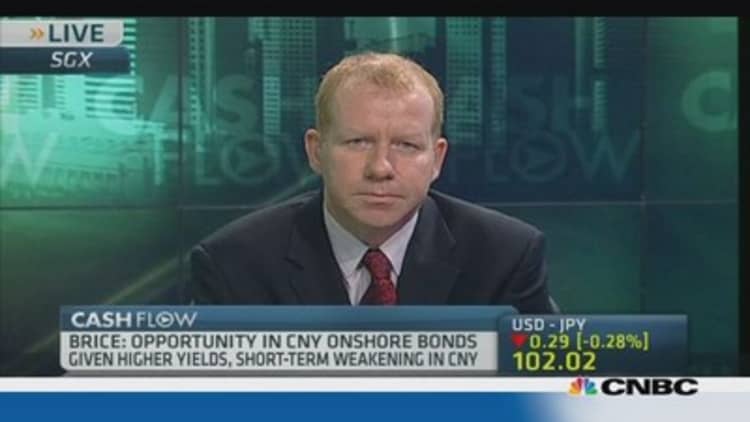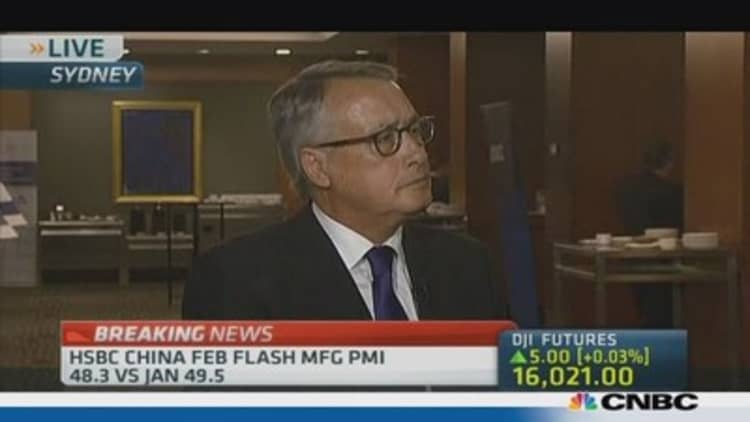
China's manufacturing activity slowed to a seven-month low in February, a private survey showed on Thursday, once again stirring concerns over the health of the world's second-largest economy.
The flash Markit/HSBC Purchasing Managers' Index (PMI) fell to 48.3 from a final reading of 49.5 in January.
This is the second straight month the PMI has fallen below 50, which signals contraction.
"Economic activity has slowed in early 2014. Tighter credit in the fourth quarter of 2013 has made inventories more difficult to finance, prompting manufacturers to destock in February," said Bill Adams, senior international economist with financial services firm PNC.
The reaction in markets was swift; the Australia dollar fell half a U.S. cent to $0.8957, from $0.9004 before the data, while Aussie stocks turned negative. Australia is particularly sensitive to data from China, its top export market.
(Read more: China,Japan headed down opposite policy paths)
Chinese stocks also pared gains, with the Shanghai Composite trading up 0.7 percent compared with its earlier rise of over 1 percent. Hong Kong's Hang Seng was down 1 percent.
A breakdown of the PMI showed new orders falling to 48.1 from 50.1 in January, and production dropping to 49.2 from 50.8. New export orders, however, rose to 49.3 from 48.4.
But getting the most attention is the employment sub-index, which Chinese policymakers are particularly attuned to. That came in at 46.9, its lowest reading since February 2009.
According to Zhiwei Zhang of Nomura, the figures back the bank's view that China will struggle to maintain its rebound.
"We reiterate our view that the recovery in China is not sustainable and that GDP (gross domestic product) growth will slow to 7.5 percent year-on-year in the first quarter and 7.1 percent in the second quarter, despite favorable base effects," he said.
"We expect the government to loosen monetary policy in the second quarter to support growth," he added.
(Read more: Is China's love for Treasurys waning?)
Earlier this week, China's central bank unexpectedly drained 48 billion yuan ($7.9 billion) from money markets following a boom in lending at the start of the year, a sign that the tightening bias by the central bank remains in place.
Data confusion
The latest data adds to confusion over the true state of China's economy. While factory activity has been weakening since the start of the year, bank lending and trade data in January painted a rosy picture.
Blurring the picture further is the fact that Chinese data at the start of the year is typically distorted due to the Lunar New Year effect, when many businesses wind down operations.
According to Steve Brice, chief investment strategist at Standard Chartered Wealth Management, the fluctuations in the data won't change the fact that Chinese policymakers want to rebalance the economy and will tolerate slower growth in the forseeable future.
(Read more: The China risk you may have forgotten about)
"The authorities clearly want to support growth at some levels around 7 percent, they don't want to blow up above 8 percent as they manage the credit bubble," he said. "Overall, the picture will not be positive coming out of china for some time."

Former Treasurer of Australia, Wayne Swan, also weighed in on the China debate.
"China growing at 7 percent plus is still very big and important contribution to global growth, we should never lose sight of that. The Chinese are reorienting their economy from export-led growth to more domestic consumption, so this is not going to be an easy thing for them," he told CNBC on the sidelines of the G20 meeting that will kick off in Sydney this weekend.
"But I believe Chinese government has the will power and the confidence to ensure that their economy continue to grow. I don't think there's a need to panic every time we see a PMI which might be a bit below the average," he added.
— By CNBC's Li Anne Wong. Follow her on Twitter @LiAnneCNBC


